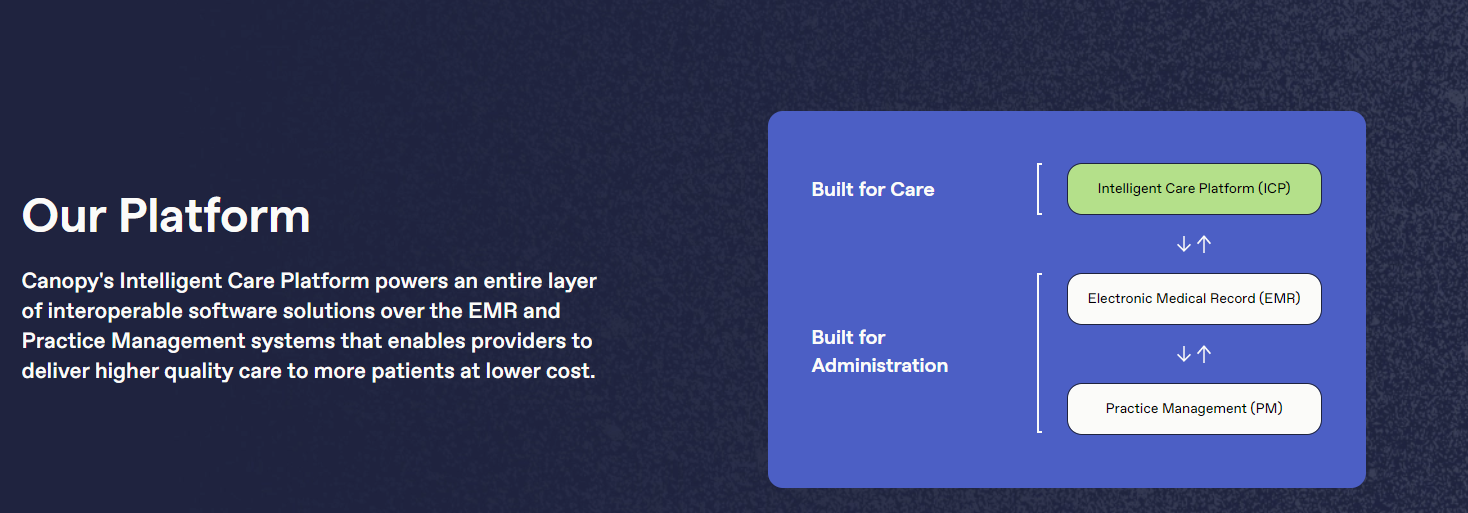
What You Should Know:
– Today, Canopy announced it is launching out of stealth with $13 million in funding to work with leading oncology practices all over the country to help deliver high-quality care to cancer patients when they aren’t in the doctor’s office.
– Canopy works with leading oncology practices nationwide to drive the best possible outcomes for over 50,000 cancer patients.
Canopy, a Palo Alto, CA-based Intelligent Care Platform (ICP) for oncology, today announced it has raised $13 million in funding led by GSR Ventures, with participation from Samsung Next, UpWest, and other industry leaders and executives, such as Geoff Calkins (former SVP Product, Flatiron Health), and Chris Mansi (CEO Of Viz.AI). Formerly known as Expain, Canopy is also launching out of stealth today to make its platform generally available to cancer treatment centers across the U.S.
Intelligent Care Platform for Oncology

Kwiatkowsky founded Canopy in 2018 after a personal encounter with the healthcare system highlighted the challenges created by today’s episodic care, particularly in complex disease areas such as oncology. Through the process, he realized that care teams are inundated with information, tasks, and challenges, limiting their ability to adopt important technologies to improve care. That experience led to Canopy’s key insight: “in order to help patients, you need to help the practice first.” Prior to founding Canopy, he spent the past 16 years of his career in an elite Israeli intelligence unit, and later in Israeli startups, leading large-scale projects relating to data processing, AI, and machine learning.
Due to the brief and episodic nature of office-based cancer care, up to 50 percent of patient symptoms and treatment side-effects will go undetected. This often leads to avoidable hospital visits and a poor experience, and more importantly, may result in detrimental treatment discontinuations, hurting patients’ survival probability. This has been exacerbated during the pandemic as oncologists have relied on spreadsheets, phone calls, and other manual processes that are inefficient, costly, and unsustainable. Studies show that remote monitoring of patients receiving cancer treatment leads to improved quality of life, satisfaction, and overall survival, but providers lack the tools to deliver remote and proactive care.
Canopy flips that model on its head by enabling physicians to interact with their patients continuously and proactively. Canopy’s Intelligent Care Platform includes a full suite of intelligent, electronic health-record integrated tools to help cancer centers continuously engage with their patients, streamline clinical workflows, and capture new reimbursement streams for their meaningful work. As a result, care teams can better direct resources from repetitive manual work to supporting the patients who need them most, leading to improved patient outcomes at lower costs.
Improve patient experience and outcomes while optimizing for practice success
Working with leading oncology practices nationwide, Canopy’s platform has demonstrated high rates of patient enrollment (86 percent), engagement (88 percent), retention (90 percent at 6 months), and timely nursing intervention rates (88 percent). Canopy has clinical results slated for publication in 2022 demonstrating reductions in emergency department utilization and inpatient admissions, as well as increases in time on therapy.
Canopy is the preferred vendor for the Quality Cancer Care Alliance (QCCA) and works with leading oncology practices across the country, including Highlands Oncology Group, Cancer Specialists of North Florida, Northwest Medical Specialties, Los Angeles Cancer Network, Cancer and Hematology Centers of Western Michigan, and Tennessee Cancer Specialists (TCS).
“Canopy’s mission is to provide every person undergoing cancer treatment with the best possible outcomes and experience,” said Lavi Kwiatkowsky, founder and CEO of Canopy. “We have already demonstrated in cancer treatment centers across the US that a proactive care delivery model is not only possible but effective. Now, we are focused on expanding our presence nationwide while increasingly deploying artificial intelligence to maximize the benefits we deliver to patients and their care teams.”
